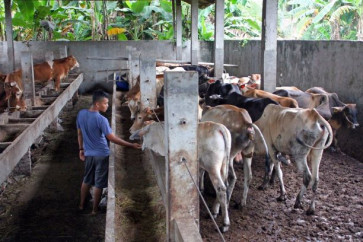Court rejects petition to legalize medical marijuana
The court concluded that there was insufficient research in Indonesia to justify a ruling in favor of the petitioners, who challenged the ban on the use of medical marijuana in the 2009 Narcotics Law.
Change text size
Gift Premium Articles
to Anyone

T
he Constitutional Court rejected on Wednesday a petition to legalize medical marijuana filed by three mothers of children with terminal illnesses needing the drugs to treat the symptoms.
The court concluded that there was insufficient research in Indonesia to justify a ruling in favor of the petitioners, who challenged the ban on the use of medical marijuana in the 2009 Narcotics Law.
Under the law, cannabis is categorized as a type-1 narcotic that is prohibited from being consumed in Indonesia, including for therapeutic purposes and its production explicitly banned except for certain research purposes, alongside opium, cocaine and methamphetamine. It is among the world’s harshest drug regulations.
The court rejected the arguments of the petitioners that pointed to dozens of other countries that had legally provided treatments using cannabis and its derived substances.
But the nine-member bench also said that “the government needs to immediately conduct research” on the use of medical marijuana.
“The results of which can be used to determine policies, including, in this case, the possibility of changing the law," Justice Suhartoyo read out the ruling, adding that the authority to re-categorize marijuana fell with the policymakers, not the court.
The petitioners had argued that the ban violated the Constitution, which protects their right to enjoy the benefits of scientific advancement and the right to health care.
The petition was filed in late 2020 by the three mothers of children with cerebral palsy and three pro-medical marijuana civil groups.
One of the mothers is Santi Warastuti, whose public plea to legalize medical marijuana for her 12-year-old daughter with cerebral palsy went viral last month following a tweet by a famous Indonesian singer.
Two days later, Vice President Ma’ruf Amin, who is a former Indonesia Ulema Council (MUI) chairman, instructed the top Islamic clerical body to issue a fatwa to allow the use of marijuana for medical purposes.
This was followed by Health Minister Budi Gunadi Sadikin, who said that the ministry was also seeking to publish new regulations aimed at allowing research on the medicinal benefits of marijuana. Meanwhile, lawmakers are mulling over a possible revision to the narcotics law to legalize medical marijuana, following lobbying by Santi.
‘Big disappointment’
The three mothers said that they were disappointed but “not surprised” by the ruling.
Seeing their hope dashed by the court, they turned to the government to come up with at least a temporary solution for their children while future research into medicinal marijuana was still ongoing.
“It's a big disappointment. Research [into marijuana] as a medicine takes time. Meanwhile, parents like us are in a race against time [to save our children,” Santi told reporters outside the courtroom on Wednesday.
Another mother in the list of petitioners is Dwi Pertiwi, whose son lived with cerebral palsy until his death at the age of 16 in December 2020 before the preliminary hearings had barely begun.
In 2016, her son underwent cannabis therapy in Australia for a month, which, according to Dwi, caused a significant improvement in his health. Upon returning to Indonesia, Dwi had to stop her son’s therapy or face years in prison – even for the mere possession of marijuana.
“The drugs available currently are not helpful for our children [...] When we can’t use [medicinal marijuana] for our children, what is the [government’s] solution?” Dwi said on Wednesday.
“If there will be research looking into the use of medical marijuana, it needs to be quick.”
Past criminalization
High-profile prosecutions in the past have also sparked debates over the need to decriminalize cannabis for medical use.
In 2020, a man named Reyndhart Siahaan was convicted to 10 months imprisonment for consuming marijuana to relieve the pain caused by spinal cord compression, a disease he has suffered from since 2015.
Another man named Fidelis Arie was sentenced to eight months in prison and fined Rp 1 billion (US$66,768) for growing marijuana to treat his terminally ill wife in late 2017. His wife died a month after he was arrested earlier that year.









